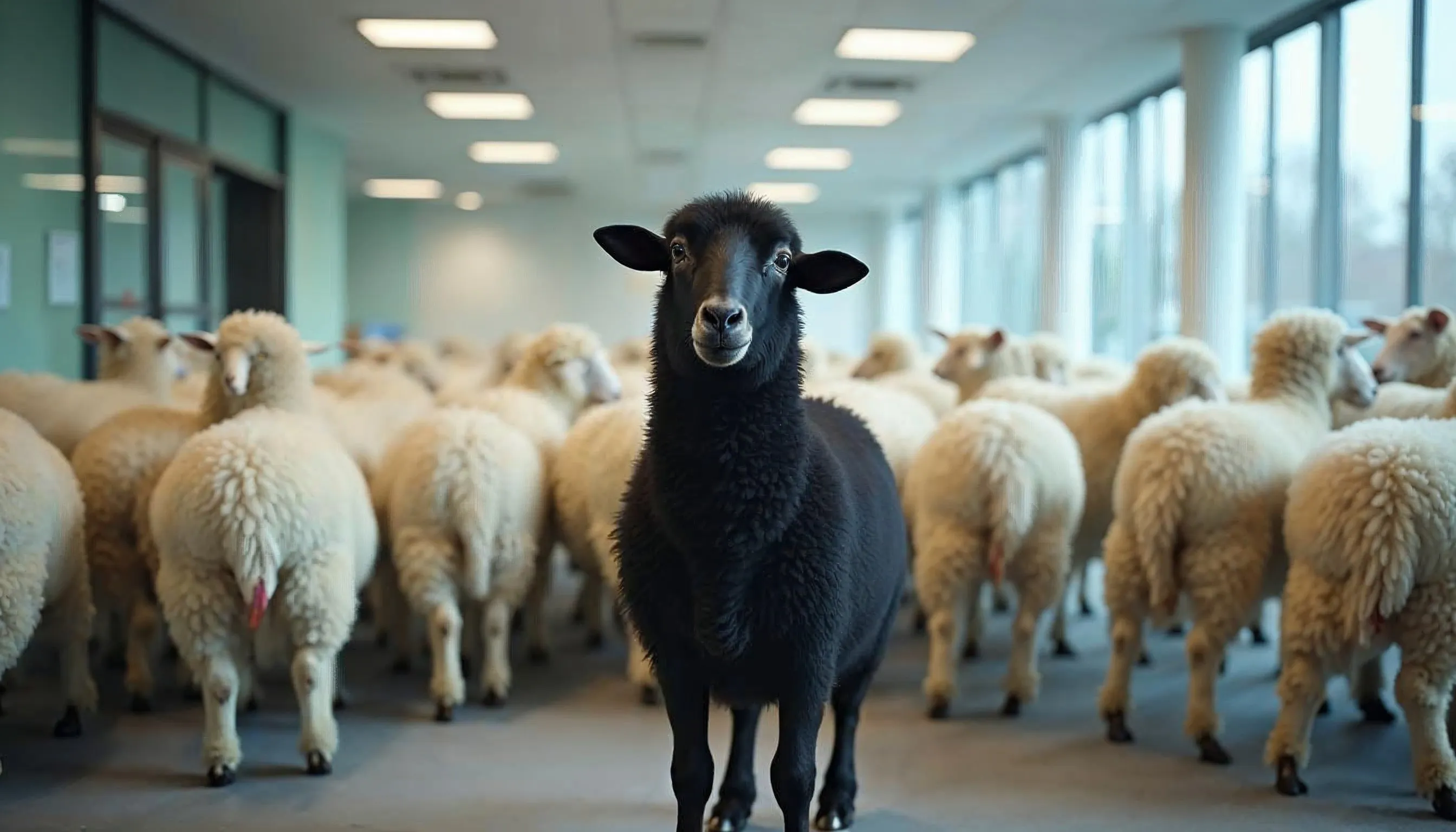The black sheep in the team
The metaphor of the "black sheep" is familiar to many since childhood. It has a negative connotation, and parents often worry that their child may become an outsider among peers. This concept has also firmly established itself in the workplace, where being different can cause significant difficulties for an employee.

The black sheep is perceived by the team as someone who is considered "foreign" or "not belonging." This evaluation is based on being different, usually due to different values. In the workforce, there are also deliberate outsiders – individuals who strive to stand out and make a statement. These are courageous and often bold individuals with clearly defined views, actively demonstrating that they will not sacrifice these for recognition.
Table of Contents
Reasons for Rejection in the Workgroup
Typically, newcomers are objects of particular observation. Social prejudices affect appearance, behaviors, and marital status. Employees observe what the newcomer eats for lunch, what cigarettes they smoke, and what they use to commute to work. Any little detail can become a reason for bullying. An individual subjected to the pressure of imposed norms sooner or later loses their unique characteristics and becomes one among many alike.
Sometimes the problem does not lie with the outsider themselves. The inability to find common ground is explained by the fact that the environment simply does not know how to react to foreign individuality. Their difficulties are personal in nature. A person is more likely to blame a completely innocent colleague for their problem rather than look within themselves.

Toxic Behavior and Bullying
In the workplace, there is the phenomenon of bullying – psychological terror within a group. Bullying refers to the harassment of an employee by colleagues, subordinates, or superiors. The aim of such harassment is to compel the employee to leave the workplace or weaken their social or professional influence within the team.
There are two main types of bullying. Vertical bullying (bossing) comes from superiors to subordinates or from the workforce to new managers. Horizontal bullying manifests as pressure from a group of colleagues on an individual employee. Victims of bullying are usually employees who are insecure and highly value the opinions of others.
Survival Strategies for Outsiders
An employee who realizes they are not being taken seriously or mocked should consider what they are doing to provoke this reaction and how they can change their behavior. Sometimes it is not about the individual, but about the work atmosphere that fosters gossip and intrigue. In this case, it is better to change jobs rather than trying to build relationships with a team that causes discomfort.
One must not forget personal boundaries and should not force themselves to discuss uninteresting or compromising topics with colleagues. Personal boundaries help build more comfortable relationships rather than alienating from the team. Experts recommend seeking a person with a similar temperament and interests in the workgroup, who can become an ally.
An interesting fact: In the countries of the former Soviet Union, an outsider is referred to as a "white crow." This metaphor is in direct contrast to the German-speaking "black sheep." While in the German language, the dark color symbolizes otherness, in the CIS countries, the white color expresses being different. However, both metaphors describe the same phenomenon - a person who differs from the majority.

The Role of Individuality in Business Development
There is another important aspect of the outsider phenomenon. In a well-established team, a personality comes in who is different from the rest and does not necessarily stand out to their advantage from the group. Such an individual may encounter obstacles and negativity initially but can eventually become a leader and elevate the company to a new level.
The standardization of the intellectual sphere was cultivated with a specific goal – it accelerated the formation of civilization. Uniqueness was viewed as hostile because it did not conform to the masses to apply uniform influence mechanisms. However, if everyone had been leveled, there would have been no art, no progress on a global scale.
A person who acts "different from the rest", has their own viewpoint, and applies innovations in their work often faces rejection by the majority initially. However, they usually do not aim to please, stand out, or prove something. Society sooner or later recognizes individuals who were able to realize themselves. The ability to set goals and solve tasks with creative thinking leads such individuals to success. They are not conflict-ridden or destructive and do not necessarily have to stand out from the crowd. Such outsiders can be learned from and serve as role models.
Ultimately, the success of an outsider in the workplace depends on many factors: the personal characteristics of the individual, the team atmosphere, the leadership position and the willingness of the company to accept new ideas and approaches. The most important thing to remember is that being different doesn't have to be a disadvantage, but can become an advantage if one utilizes their uniqueness properly and does not allow a toxic environment to undermine their confidence.
The issue of the black sheep in the team is closely related to the problem of toxic behaviors in the workplace. Those interested in delving deeper into this topic should also explore manipulators, provocateurs, and toxic personalities in the work environment. These individuals often use subtle psychological tactics to achieve their goals and can significantly affect the work atmosphere. It is particularly important to recognize such behavior patterns early and respond appropriately. A deeper understanding of these dynamics not only helps in self-protection but also in creating and maintaining a healthy work environment for all team members.
From Vitalii Shynakov
